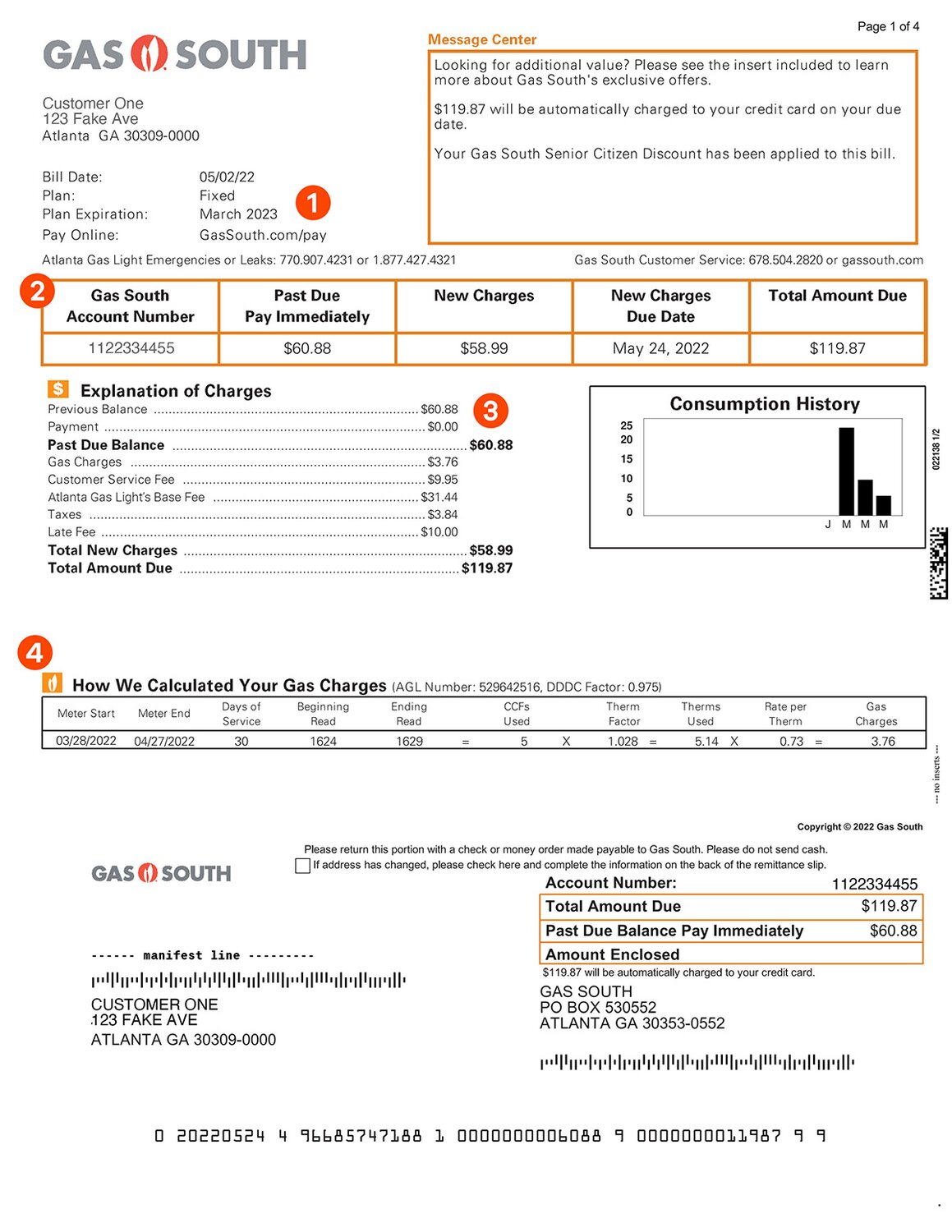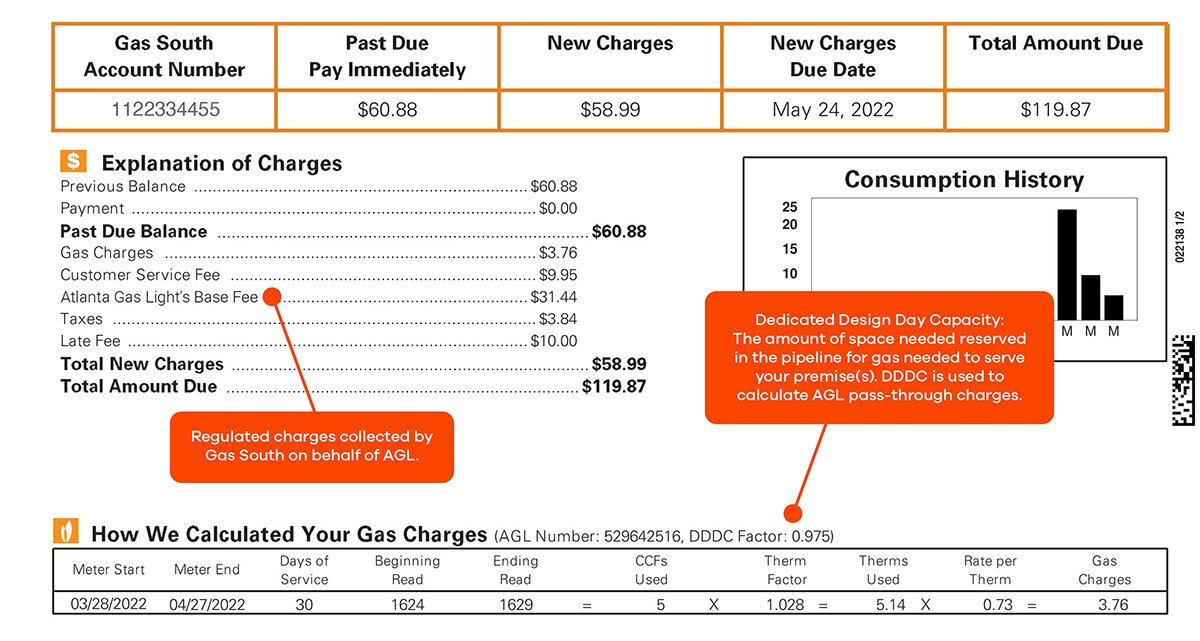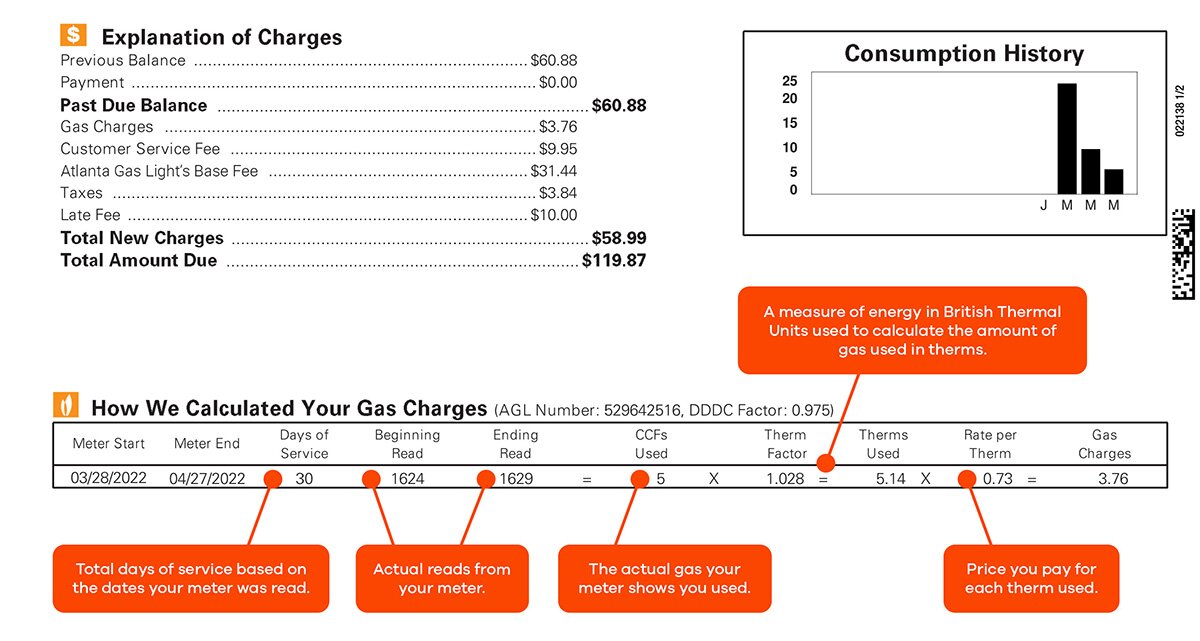How to Read Your Gas Bill
Your natural gas bill contains a lot of information, but we think reading your bill should be easy. That’s why we’ve created this guide to clear up any confusion and help you read and understand your Gas South bill.

What Your Gas Bill is Telling You
- Account Details: This section provides your account details at a glance. It lists your bill date, plan expiration date and whether you’re signed up for a fixed rate, variable rate or OnePrice Plan®. If you’re enrolled in a fixed plan, your rate remains the same month after month while variable rate plans fluctuate, according to market conditions. With our OnePrice Plan, you pay the same flat, monthly rate for the length of your agreement.
- Monthly Summary: This table is a snapshot of what you owe this month. It includes your Gas South account number, any past due amounts you owe, current charges, your payment due date and the total amount that’s due.
- Explanation of Charges: Here, we itemize the charges, fees and taxes associated with this month’s bill.
On Fixed or Variable Rate Plan Charges: Additionally, If you’re not a OnePrice Plan customer, you’ll see a listing for gas charges, which indicates the total cost of gas used during the billing period. The customer service fee is Gas South’s cost of servicing your account, and Atlanta Gas Light's Base Fee are regulated charges on behalf of AGL (Atlanta Gas Light). You’ll also see a graph on the right that shows your natural gas consumption history. - Calculations/Bill Information: On each bill, Gas South provides more detailed information on your current charges. The grid encompasses readings from your meter. If you’re on a fixed or variable rate plan, we take the readings and calculate it by the thermal factor to obtain the amount of gas that’s used in therms. A therm is simply a unit of heat, similar to the watts on your electric bill. Next, we multiply the therms by your current rate plan (e.g. $0.51 per therm) to determine this month’s charges. You might also see a DDC Factor listed at the top of this table. If you’re curious, you can learn more about the DDC Factor.
What is Atlanta Gas Light's Base Fee?
Have you ever looked at your natural gas bill and wondered what Atlanta Gas Light's Base Fee is? Atlanta Gas Light's Base Fee, also sometimes referred to as Base Charges, reflect Atlanta Gas Light’s costs for maintaining natural gas pipelines and storage facilities, as well as reading your meter each month. Atlanta Gas Light's Base Fee is exactly the same regardless of which natural gas marketer you choose. These charges are calculated by AGL and regulated by the Georgia Public Service Commission.
Who is AGL?
If you’re in Georgia, chances are Atlanta Gas Light (AGL) is the utility company that owns the pipeline system that delivers natural gas to your property. Rather than receiving a separate bill from AGL, Atlanta Gas Light's Base Fee is applied and sent to your natural gas marketer and those charges are "passed through" to you—without any additional cost or mark-up. You’ll see the charges from AGL on your Gas South bill, just like in the sample bill below.
How does AGL calculate my monthly charges?
Atlanta Gas Light's Base Fee is independent of your current month’s gas usage. You will notice that these charges vary month to month and tend to be higher in the winter months. So, how is Atlanta Gas Light's Base Fee calculated and what exactly does Atlanta Gas Light's Base Fee cover? The AGL charges include:
- Customer Charge: A fixed monthly fee for gas connection to your home or business.
- Ancillary Service: Covers the cost of AGL to read your meter.
- Social Responsibility Fee: Covers the cost of funding the Senior Citizens Discount Program for low-income customers. (This does not apply to customers who receive the senior citizens discount.)
- Strategic Infrastructure Development and Enhancement (STRIDE): Covers the cost of specific Georgia Public Service Commission-approved programs to maintain the integrity and reliability of the AGL pipeline system.
- Dedicated Design Day Capacity (DDDC): A charge that recovers costs associated with delivering gas to your home or business.
- Peaking Service: Covers the fixed cost of operating company-owned aboveground storage facilities. This ensures an adequate supply of gas on the coldest days of the year. This service is only charged to customers in certain areas of the state.
- Franchise Recovery Fee (FRF): Recovers fees paid by AGL to local governments for the use of public rights-of-way for natural gas lines and other facilities.
- Environmental Response Cost (ERC) Recovery Fee: Recovers expenses related to cleanup of former manufactured gas plant sites.
When will I get charged Atlanta Gas Light's Base Fee?
Atlanta Gas Light's Base Fee is assessed on the 20th of every month for the next month of service. AGL assesses the full monthly pass-through charges each month regardless of the actual number of days you receive service or the amount of gas you use in that particular month. You’ll see Atlanta Gas Light's Base Fee on each bill monthly as the AGL charges are spread over an entire year rather than when gas is used.

What is the DDDC Factor?
The DDDC factor, or Dedicated Design Day Capacity, is a calculation done by AGL that indicates how much natural gas is reserved (or “dedicated”) for your home or business based on previous gas usage and the demand on the coldest day of the year. AGL is responsible for having enough pipe and storage capacity to meet every customer’s need during extreme cold weather conditions, and this calculation ensures that happens.
How is the DDDC factor calculated?
The DDDC covers the cost of operating the system on the coldest day of the year, and it’s recalculated every year. For most residential customers and small businesses, natural gas is used for heat. And when it’s cold outside, you’ll want enough natural gas to keep your home or business warm. So your DDDC Factor is calculated using past usage history, the number of gas appliances and additional factors that determine the location’s demand on the system.
If you’re a new customer and Atlanta Gas Light doesn’t have 12 months of consumption history, the DDDC is calculated based on the gas equipment used, your square footage and the type of structure.
Why does my DDDC seem to change?
AGL recalculates and updates the DDDC at your location annually. So each September, you’ll see it updated on your bill. During this yearly calculation, AGL reviews the past gas consumption and usage pattern at your home or business. The most important influence on your DDDC calculation is how much gas was used last year during the coldest period compared to your typical summer usage (if any). AGL calculates how much natural gas you typically need during cold weather, and that that helps set your DDC so they know how much to reserve for your home or business. Because your DDDC affects Atlanta Gas Light's Base Fee, you may see a change in the amount of your bills year to year if your DDDC is adjusted. Remember, your DDDC Factor is tied to your location. So, if you move, your DDDC will be changed for your new location and then will be reset, as usual, in September.

We're here to help!
Understanding your natural gas bill can make life easier—and using natural gas efficiently can save you money! If you ever have any questions about your bill, you can contact one of our helpful Customer Care representatives.
Regular Fees That May Show Up On Your Bill
As a Gas South customer, you deserve the best. And part of that means great rates and service and never having to worry about a deposit when you join. Another part means transparency about customer fees included in your bill. As Georgia’s most-trusted provider, we know there’s value in being upfront about these costs. Below, you’ll find a list of regularly occurring fees and potential charges customers might see in different scenarios.
Activation Fee (New Service or Switch)
Every natural gas provider in the state charges an activation fee when you’re having your natural gas turned on. This is true if it’s being turned on for the first time at your new home or if you’re switching from one provider to another more than once in a year. At Gas South, we charge an initial $60 activation fee for residential and small business customers. If you switch more than once in a year, the fee is $7.50.
Atlanta Gas Light's Base Fee (Monthly)
Your utility company, Atlanta Gas Light (AGL), charges this fee, and it can vary depending on the size of your home and your natural gas usage. No matter which natural gas provider you choose, AGL will charge this fee to help pay for the cost of natural gas storage and maintaining natural gas delivery lines. In Georgia, natural gas providers are required to collect this fee on behalf of AGL, and so it’s included in your monthly bill—but there’s never any markup or added costs on our end.
Customer Service Fee (Monthly)
Each month, most of our plan types will include a customer service fee in your bill. It helps cover the costs of the services we offer beyond natural gas itself. Each natural gas provider in the state charges this fee, whether they list it or not. At Gas South, this monthly fee can typically range from $5.95 to $9.95, depending on your service location and credit score. Some seniors qualify for a reduced fee of $4.95 per month.
There is an exception: With Gas South’s OnePrice Plan®, you never pay a customer service fee. You just pay the same price every month, no matter the season, making it easy to set it and forget it.
Payment Fees (Late Bill Payments)
Gas South doesn’t charge processing fees when customers make payments on time. We do, however, charge a standard fee of $10 or 1.5% of the outstanding balance (whichever is greater) if you’re late on your bill. Additionally, we charge $30 for payments returned due to bad checks or insufficient funds.
Early Termination Fees (Cancelling Contracted Service)
Like every other natural gas provider in the state, Gas South charges an early termination fee if you cancel service on a fixed rate plan before the end of your contracted term—there's never a contract with a variable rate. Our early termination fee is $150. Other providers can charge a range of up to $300, depending on the term you’ve selected and the provider you’ve chosen.
 Help
Help Giving Back
Giving Back My Account
My Account Sign Up
Sign Up











